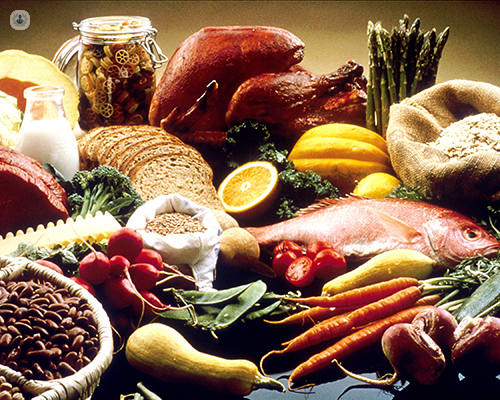Kid's diet
Dr Silvia Pierini - Paediatrics
Created on: 04-21-2017
Updated on: 10-03-2023
Edited by: Carlota Pano
What is a kid's diet?
A child’s diet should be balanced and nutritious. It is important to teach children that good eating habits are essential for their proper physical and intellectual development, and to establish appropriate eating habits. Children’s nutrition should be the responsibility of family, guardians, and the school.

Why is a kid's diet needed?
If a child's diet is not adequate, there could be a delay in their development, they could develop cardiovascular diseases, or they could suffer from obesity in the future.
What does a child's diet consist of?
A diet for children should be balanced, with regular meals, and fresh and varied products. It should include five portions of fruit and vegetables a day, and a greater quantity of whole grain cereals instead of refined foods. Food should be steamed or grilled whenever possible. Junk food should be avoided. Fried food, pre-cooked meals, and sugary drinks and sweets should be kept to a minimum.
Nutrient-dense foods should feature:
- Protein: Protein is needed for the growth and repair of cells. Sources include lean meat, fish, dairy, eggs, beans, soy products, unsalted seeds and nuts, and pulses. It is recommended that children eat at least two portions of fish a week; one of which should be oily fish like salmon or trout. Oily fish is a good source of omega 3 fatty acids to keep the heart and brain healthy. Iron, which is vital to transport oxygen around the body, can also be found in lean meat, beans and nuts.
- Fruits: A child should be encouraged to eat a variety of fresh fruits. Try to avoid fruit juice.
- Vegetables: Serve a variety of fresh vegetables. Aim to provide a variety of vegetables, including dark red, green and orange, beans and peas, starchy and others, each week.
- Fat: A small amount of fat is needed in the diet, but too much saturated fat can lead to cardiovascular problems later in life. Saturated fat products like butter, cakes and fatty meats should be replaced with extra virgin olive oil and foods that contain healthier fats like avocado, nuts and seeds.
- Carbohydrates: These are essential for energy and include foods like potatoes, bread, pasta, and fortified breakfast cereals. Potatoes with skins have more fibre, and whole grain cereals are better than refined versions. Choose whole-wheat bread and whole grains, oatmeal, quinoa, or brown or wild rice.
- Dairy: Yoghurt, cheese or fortified vegetable milk. Calcium is essential for strong bones and teeth. Calcium can be found in dairy products like milk and cheese, and anything made with fortified flour. Vitamin D, also found in dairy, is essential for the growth and development of strong bones.
Limit calories from:
- Added sugar: Limit added sugars. Instead, stick with naturally-occurring sugars, such as those in milk and fruit.
- Saturated and trans fats: Limit saturated fats — they mainly come from animal sources of food, such as red meat, poultry, and full-fat dairy products.
- Fried foods: Fried foods should not be given to children. Whenever possible, opt for steaming or boiling, and avoid so-called "junk foods" and pre-cooked meals. Try to control the consumption of sugary drinks and sweets as well.
How to prepare a child for their diet
For a child to follow a good diet, they must be taught the importance of good eating habits, and therefore, it must be explained what bad eating habits mean. Children should also engage in regular physical activity, which complements the diet and helps prevent problems resulting from poor nutrition.
